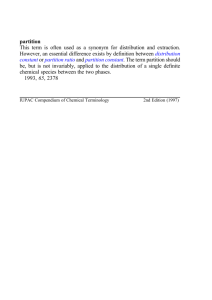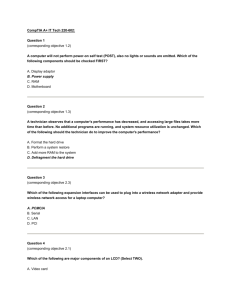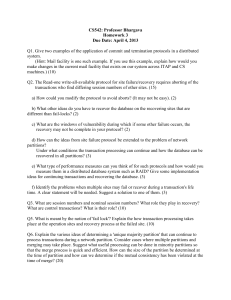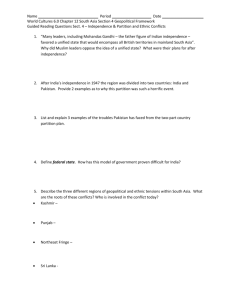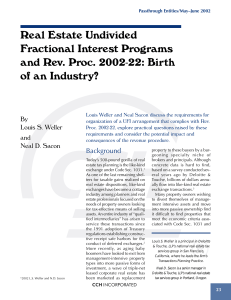Estates & Trusts
advertisement
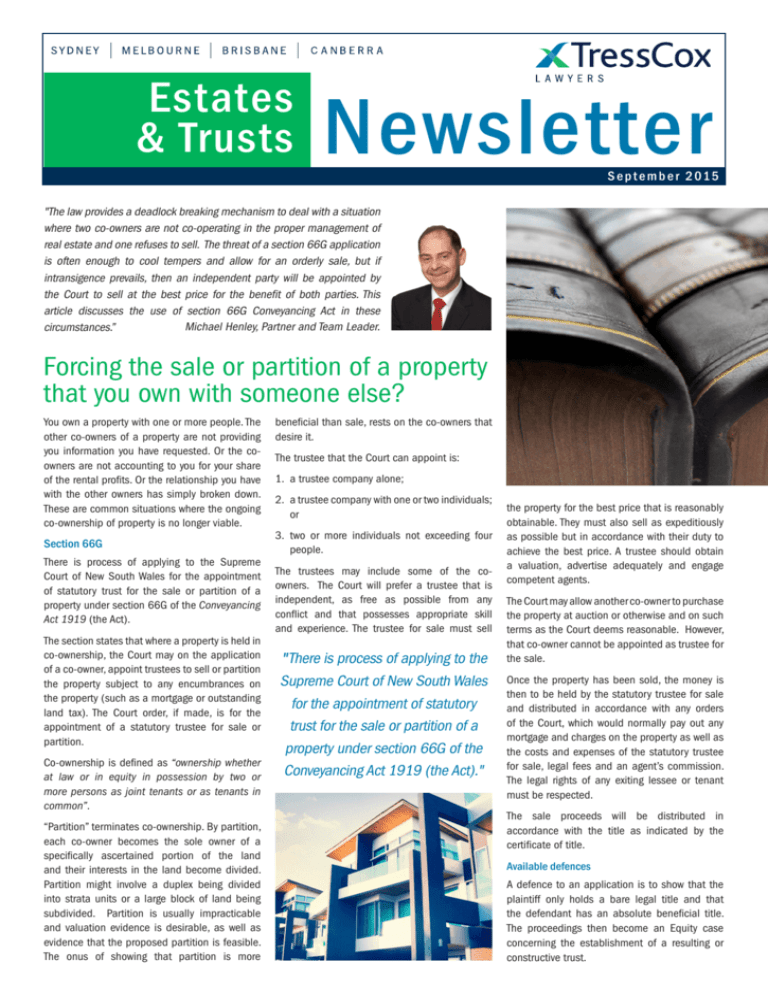
Estates & Trusts Newsletter S e p t e m b e r 2 01 5 "The law provides a deadlock breaking mechanism to deal with a situation where two co-owners are not co-operating in the proper management of real estate and one refuses to sell. The threat of a section 66G application is often enough to cool tempers and allow for an orderly sale, but if intransigence prevails, then an independent party will be appointed by the Court to sell at the best price for the benefit of both parties. This article discusses the use of section 66G Conveyancing Act in these Michael Henley, Partner and Team Leader. circumstances.” Forcing the sale or partition of a property that you own with someone else? You own a property with one or more people. The other co-owners of a property are not providing you information you have requested. Or the coowners are not accounting to you for your share of the rental profits. Or the relationship you have with the other owners has simply broken down. These are common situations where the ongoing co-ownership of property is no longer viable. Section 66G There is process of applying to the Supreme Court of New South Wales for the appointment of statutory trust for the sale or partition of a property under section 66G of the Conveyancing Act 1919 (the Act). The section states that where a property is held in co-ownership, the Court may on the application of a co-owner, appoint trustees to sell or partition the property subject to any encumbrances on the property (such as a mortgage or outstanding land tax). The Court order, if made, is for the appointment of a statutory trustee for sale or partition. Co-ownership is defined as “ownership whether at law or in equity in possession by two or more persons as joint tenants or as tenants in common”. “Partition” terminates co-ownership. By partition, each co-owner becomes the sole owner of a specifically ascertained portion of the land and their interests in the land become divided. Partition might involve a duplex being divided into strata units or a large block of land being subdivided. Partition is usually impracticable and valuation evidence is desirable, as well as evidence that the proposed partition is feasible. The onus of showing that partition is more beneficial than sale, rests on the co-owners that desire it. The trustee that the Court can appoint is: 1. a trustee company alone; 2. a trustee company with one or two individuals; or 3. two or more individuals not exceeding four people. The trustees may include some of the coowners. The Court will prefer a trustee that is independent, as free as possible from any conflict and that possesses appropriate skill and experience. The trustee for sale must sell "There is process of applying to the Supreme Court of New South Wales for the appointment of statutory trust for the sale or partition of a property under section 66G of the Conveyancing Act 1919 (the Act)." the property for the best price that is reasonably obtainable. They must also sell as expeditiously as possible but in accordance with their duty to achieve the best price. A trustee should obtain a valuation, advertise adequately and engage competent agents. The Court may allow another co-owner to purchase the property at auction or otherwise and on such terms as the Court deems reasonable. However, that co-owner cannot be appointed as trustee for the sale. Once the property has been sold, the money is then to be held by the statutory trustee for sale and distributed in accordance with any orders of the Court, which would normally pay out any mortgage and charges on the property as well as the costs and expenses of the statutory trustee for sale, legal fees and an agent’s commission. The legal rights of any exiting lessee or tenant must be respected. The sale proceeds will be distributed in accordance with the title as indicated by the certificate of title. Available defences A defence to an application is to show that the plaintiff only holds a bare legal title and that the defendant has an absolute beneficial title. The proceedings then become an Equity case concerning the establishment of a resulting or constructive trust. T h e Tr e s s C o x E s t a t e s & Tr u s t s N e w s l e t t e r The only other real dispute could concern the proportions in which the net proceeds of sale should be divided where it is alleged that the beneficial title is held in different proportions from that shown on the certificate of title. "In reality, the proceedings are generally not resisted. They are usually brought to confront a reluctant coowner with the realities of his or her position. As it is much cheaper for the co-owners to co-operate, a properly advised co-owner will, upon service of proceedings, co-operate with the plaintiff in the sale of the land and the distribution of the proceeds." Further, a Court may refuse an application under special circumstances. For example, if all the owners had previously agreed not to sell the property unless all owners agreed to it or if there are contractual or fiduciary obligations which the Court finds should be honoured. A party opposing a sale or partition has the onus of dissuading the Court from ordering a sale or partition, whichever is sought. The Court cannot refuse an application simply on the grounds of hardship or unfairness. In reality, the proceedings are generally not resisted. They are usually brought to confront a reluctant coowner with the realities of his or her position. As it is much cheaper for the co-owners to co-operate, a properly advised co-owner will, upon service of proceedings, co-operate with the plaintiff in the sale of the land and the distribution of the proceeds. Wherever possible, parties should be advised to agree on a regime for the marketing and sale of the property in order to minimise costs which will include the costs of the trustees (usually accountants) charged with the sale of the property. Costs In the case of MacDonald v MacDonald [2009] NSWSC 794, the Court stated: “The usual order that is made concerning costs of an application… is that the costs of the parties be paid out of the proceeds of sale, and where there is unsuccessful opposition by one or more of the co-owners, that the costs of the successful plaintiff be paid out of the share to which the opposing coowners would be entitled”. If the other co-owners decide not to contest the matter, then is it likely that the Court will order that each party pay their own costs from their own share of the sale proceeds. However, if the application is contested and the other co-owners are unsuccessful, the Court will likely make an order requiring the co-owners to pay a portion of the plaintiff’s costs (referred to as your costs on a party and party basis) from their own share of the sale proceeds. Prior to commencing proceedings, a person would be best placed to write to the co-owners first threatening to make such an application to the Court. The matter may also resolve without the need for commencing proceedings. An alternative outcome could be that the other co-owners might offer to buy the aggrieved person’s share of the property. If you find yourself in a scenario like the ones described above, you may wish to apply to the Court seeking orders for the appointment of a statutory trustee for sale or partition. Our Wills & Estates Team would be happy to assist you with such an application. Luke Friedman - Associate Phone: +61 2 9228 9373 Luke_Friedman@@tresscox.com.au Go to www.tresscox.com.au to view this article and more online Do you want to republish this article? If you currently edit an industry publication or would like this article to appear in your newsletter, then please contact our Marketing & Business Development Team on (02) 9228 9200 to assist you. Global Affiliations - ALFA International In order to provide legal services around the globe, TressCox maintains strong international affiliations with other law firms through our membership of ALFA International. Founded in the USA in 1980, ALFA International is the premier association of law firms in the world and is currently comprised of over 140 independent member firms throughout North America, Latin America, Asia / Australasia, Africa and Europe. There is only one ALFA International member firm in each major jurisdiction in Australia, with TressCox being the member firm for New South Wales and Queensland. ALFA International’s basic objective, through its member firms, is to improve the quality and efficiency of legal services and to provide those services to 2 clients at a reasonable cost. Estate & Trusts Team Contacts Michael Henley - Partner Accredited Specialist Wills & Estates Law Phone +61 2 9228 9206 Michael_Henley@tresscox.com.au Matthew Payne Partner Phone +61 2 9228 9276 Matthew_Payne@tresscox.com.au Ron Heinrich AM Senior Consultant - General Counsel Phone +61 2 9228 9209 Ron_Heinrich@tresscox.com.au Christine McPhillips - Special Counsel Accredited Specialist Wills & Estates Law Phone +61 2 9228 9210 Christine_McPhillips@tresscox.com.au Graham Englefield Special Counsel Phone +61 2 9228 9205 Graham_Englefield@tresscox.com.au Paul de Silva Special Counsel Phone +61 7 3004 3520 Paul_de_silva@tresscox.com.au Linda Goldsmith Consultant Phone +61 3 9602 9738 Linda_Goldsmith@tresscox.com.au Luke Friedman Associate Phone +61 2 9228 9373 Luke_Friedman@tresscox.com.au Nicole McOwn Paralegal Phone +61 3 9602 9449 Nicole_McOwen@tresscox.com.au www.tresscox.com.au Sydney Level 16, MLC Centre 19 Martin Place Sydney NSW 2000 Phone +61 2 9228 9200 Fax +61 2 9228 9299 Melbourne Level 9, 469 La Trobe Street Melbourne VIC 3000 Phone +61 3 9602 9444 Fax +61 3 9642 0382 Brisbane Level 4, 40 Creek Street Brisbane QLD 4000 Phone +61 7 3004 3500 Fax +61 7 3004 3599 Canberra Level 1, 88-96 Bunda Street Canberra ACT 2601 Phone +61 2 6156 4332 Fax +61 2 9228 9299 twitter.com/TressCox Liability limited by a scheme approved under Professional Standards Legislation.
